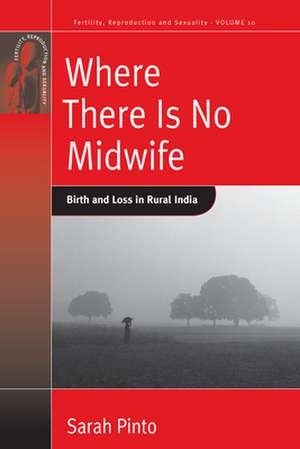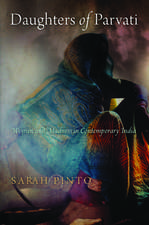Where There Is No Midwife: Fertility, Reproduction, and Sexuality
Autor Sarah Pintoen Limba Engleză Paperback – 31 oct 2011
...[the] ethnography is...rich, topical, and thought-provoking. JRAI
Pinto masterfully intertwines reproductive health experiences of women in Uttar Pradesh with wider concerns...Pinto's book is a valuable contribution to the anthropology of childbirth in India. The author has produced an insightful work enriched with detailed ethnographic descriptions, intense case studies, and nuanced personal reflections on her fieldwork and the production of ethnographic knowledge. Anthropos
In the Sitapurdistrict of Uttar Pradesh, an agricultural region with high rates of infant mortality, maternal health services are poor while family planning efforts are intensive. By following the daily lives of women in this setting, the author considers the women's own experiences of birth and infant death, their ways of making-do, and the hierarchies they create and contend with. This book develops an approach to the care that focuses on emotion, domestic spaces, illicit and extra-institutional biomedicine, and household and neighborly relations that these women are able to access. It shows that, as part of the concatenation of affect and access, globalized moralities about reproduction are dependent on ambiguous ideas about caste. Through the unfolding of birth and death, a new vision of "untouchability" emerges that is integral to visions of progress.
Sarah Pinto is an Associate Professor of Anthropology at Tufts University. She teaches courses on medical anthropology, gender, and feminist and social theory, with particular attention to cultures of biomedicine, kinship, and political, cultural, and epistemological concerns related to the human body. Her geographic area of specialization is India. She is co-editor of Postcolonial Disorders (University of California 2008), and author of numerous articles on medicine and health intervention in South Asia. She is completing an ethnography of psychiatry's treatment of women patients in urban India, asking how kinship and legal processes related to family life shape clinical practice, and how clinical practice informs subjectivities in and of intimacy. This work is particularly interested in the stakes of mental illness for divorced or divorcing women in India, and asks what these circumstances can tell us about the place of gender in framing culturally relevant ethical frameworks. Pinto is currently developing a research project on the transnational history of hysteria, focusing on dialogues on hysteria between India and Europe in the 19th and 20th centuries and their role in shaping contemporary etiologies.
| Toate formatele și edițiile | Preț | Express |
|---|---|---|
| Paperback (1) | 264.43 lei 6-8 săpt. | |
| BERGHAHN BOOKS INC – 31 oct 2011 | 264.43 lei 6-8 săpt. | |
| Hardback (1) | 807.15 lei 6-8 săpt. | |
| BERGHAHN BOOKS INC – 29 feb 2008 | 807.15 lei 6-8 săpt. |
Preț: 264.43 lei
Nou
Puncte Express: 397
Preț estimativ în valută:
50.61€ • 52.64$ • 41.78£
50.61€ • 52.64$ • 41.78£
Carte tipărită la comandă
Livrare economică 12-26 aprilie
Preluare comenzi: 021 569.72.76
Specificații
ISBN-13: 9780857451538
ISBN-10: 0857451537
Pagini: 342
Dimensiuni: 152 x 229 x 18 mm
Greutate: 0.46 kg
Editura: BERGHAHN BOOKS INC
Seria Fertility, Reproduction, and Sexuality
ISBN-10: 0857451537
Pagini: 342
Dimensiuni: 152 x 229 x 18 mm
Greutate: 0.46 kg
Editura: BERGHAHN BOOKS INC
Seria Fertility, Reproduction, and Sexuality
Notă biografică
Sarah Pinto is an Associate Professor of Anthropology at Tufts University. She teaches courses on medical anthropology, gender, and feminist and social theory, with particular attention to cultures of biomedicine, kinship, and political, cultural, and epistemological concerns related to the human body. Her geographic area of specialization is India. She is co-editor of Postcolonial Disorders (University of California 2008), and author of numerous articles on medicine and health intervention in South Asia. She is completing an ethnography of psychiatry's treatment of women patients in urban India, asking how kinship and legal processes related to family life shape clinical practice, and how clinical practice informs subjectivities in and of intimacy. This work is particularly interested in the stakes of mental illness for divorced or divorcing women in India, and asks what these circumstances can tell us about the place of gender in framing culturally relevant ethical frameworks. Pinto is currently developing a research project on the transnational history of hysteria, focusing on dialogues on hysteria between India and Europe in the 19th and 20th centuries and their role in shaping contemporary etiologies.
Cuprins
Note on transliterations Acknowledgments Beginnings Chapter 1. Work: Where there is no midwife Chapter 2. Bodies: The poisonous lotus Chapter 3. Medicine: Development without institutions Chapter 4. Seeing: Visuality in pregnancy Chapter 5. Dying: In the big, big hands of God Chapter 6. Ideals: Ciphers of tradition Chapter 7. Talking: Casting desire Continuing Notes Works Cited
Recenzii
"Drawing on the theoretical literature of medical anthropology as well as that of psychoanalysis, this is a complex, multilayered work. Pinto is a fine writer, and throughout the book her ethnography... [that] holds together brilliantly... beautifully illuminates her theoretical argument... [and] makes a significant contribution to the literature on reproduction, globalization, and development in India." * South East Review of Asian Studies "...[the] ethnography is - rich, topical, and thought-provoking." * JRAI "Pinto masterfully intertwines reproductive health experiences of women in Uttar Pradesh with wider concerns - Pinto's book is a valuable contribution to the anthropology of childbirth in India. The author has produced an insightful work enriched with detailed ethnographic descriptions, intense case studies, and nuanced personal reflections on her fieldwork and the production of ethnographic knowledge." * Anthropos
































